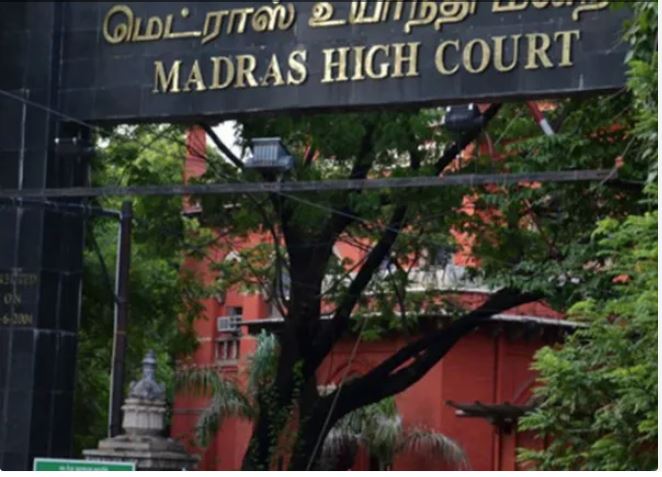The Madras High Court has held that when the Aadhaar authentication is required from people who want to avail the benefits under the Schemes which are paid out of the Consolidated Fund of State, there is no illegality whatsoever in the impugned Government Order warranting interference by the High Court in the public interest litigation.
The Division Bench of Acting Chief Justice T Raja and Justice Bharatha Chakravarthy dismissed a Public Interest Litigation (PIL) filed challenging GO.Ms.No.52, dated 06.10.2022 issued by the Additional Chief Secretary to Government, Government of Tamil Nadu (1 st respondent), in and by which, the Government has conveyed its approval directing that a notification under Section 7 of the Aadhaar (Targeted Delivery of Financial and other Subsidies, Benefits and Services) Act, 2016 (Central Act 18 of 2016), for use of Aadhaar Authentication services in the 2 nd respondent corporation namely, TANGEDCO (Tamil Nadu Generation and Distribution Corporation Limited) , to be published in the extraordinary issue of the Tamil Nadu Government Gazette, dated 06.10.2022.
The PIL has been filed by an Advocate expressing grievance that the second respondent provides electricity connections to domestic consumers and multiple dwelling units in the same address will have individual meters. Along with the owner of the property, the tenants, who are residing in the dwelling units, are practically the beneficiaries in respect of the scheme for subsidy in respect of the first 100 units. As per the tariff approved by the Tamil Nadu Electricity Regulatory Commission, the subsidy is given upto 100 units as the first 100 units are free of cost. While so, by the impugned G.O, the Aadhaar authentication process is carried out. If the Aadhaar is not linked, the bill payment will not be accepted. If the respondents go ahead with the mandatory linking of Aadhaar, in spite of the scheme that multiple dwelling units in the same address be provided with separate connections with subsidy, the users of the separate dwelling units namely, the tenants/lessees, will be deprived of the benefit of subsidy as normally the additional connections are also taken in the name of the owner and if his Aadhaar is linked, the benefit of the subsidy will be restricted to only one connection.
It is the contention of the petitioner that the entire exercise would deprive the deserving persons of the subsidy and also create hardship leading to discrimination in social welfare schemes. It is their further contention that the authentication with Aadhaar number for the scheme is arbitrary. The petitioner has also filed an additional affidavit, in which, it is contended that when the scheme envisages benefits to the individuals, it deprives firstly the tenants and secondly the people who do not have Aadhaar cards.
Upon considering the submissions made on either side and perusing the impugned Government Order and other records of the case, the Court noted that as per Section 7 of the Aadhaar Act, the Central Government or the State Government, as the case may be, for the purpose of establishing identity of an individual as a condition for receipt of a subsidy, benefit, or service, for which the expenditure is incurred from or receipt therefrom, forms part of the Consolidated Fund of India or the Consolidated Fund of the State, are enabled to require that such individual undergo authentication or furnish proof of possession of Aadhaar number or in the case of an individual to whom no Aadhaar number has been assigned, such individual makes an application for enrollment.
The Unique Identification Authority of India (UIDAI) has also issued a circular in No.23011/Gen/2014/Legal-UIDAI requiring the appropriate governments which plan to use Aadhaar for delivery of services, benefits, and subsides to publish a notification under Section 7 of the Act read with Regulation 12 so that wide publicity is given in respect thereof. It has also provided the necessary contents which the notification should contain.
Therefore, it is further noted by the Court accordingly the above Government Order is passed approving the publication of the notification in the Gazette.
“The Hon’ble Supreme Court of India in Justice K.S.Puttaswamy v. Union of India (cited supra), while dealing with the issue, had categorically held that Aadhaar authentication cannot be insisted upon only to such of the benefits earned by the individual and can be insisted upon for welfare schemes under which benefits, subsidies, or services provided to intended recipients “, relied by the High Court.
Further the Bench observed that the apprehension expressed by the petitioner, relating to tenants is unfounded as there is nothing in the impugned Government Order and the notification regarding the actual scheme of subsidy. The clauses in the notification does not in any manner alter or deal with the scheme as such. Thus, whoever is entitled to the subsidy under the Scheme is not deprived of by the impugned order. This apart, the Advocate General has also submitted that as per the scheme relating to grant of subsidy for 100 units, it is based on the domestic consumer connection and therefore the apprehension is unfounded.
“We find that even in respect of the individuals who do not possess Aadhaar number, if they still want to avail the benefit, provision is given to enrol for Aadhar and enrolment identity slip can also be provided to continue to avail the subsidy”, the order reads.


